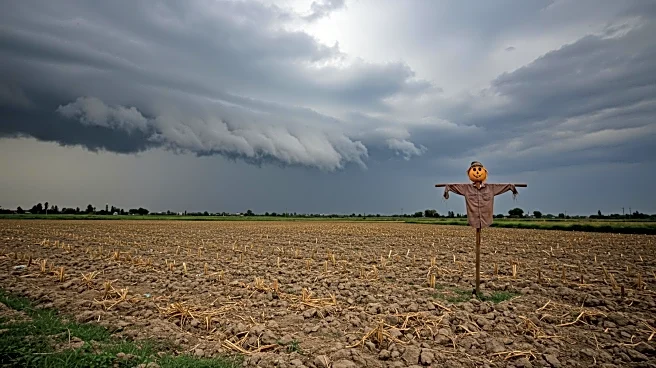What's Happening?
Khalid Khokhar, President of Pakistan Kisan Ittehad (PKI), has raised concerns over the negative growth in Pakistan's agriculture sector, attributing the decline to poor government policies and unfair pricing for wheat farmers. He highlighted the severe water shortage exacerbated by the establishment of more sugar mills, which deplete underground water reserves. Khokhar criticized the promotion of sugarcane cultivation at the expense of cotton, wheat, and oilseed crops. He noted that cotton cultivation faces an 18% tax, while maize and potato growers are not receiving fair rates, leading to a significant drop in maize cultivation.
Why It's Important?
The negative growth in Pakistan's agriculture sector poses a threat to food security and the livelihoods of farmers. The government's focus on sugarcane production is depleting essential resources and undermining the cultivation of other vital crops like cotton and wheat. The lack of fair pricing and support for farmers is driving many to abandon agriculture, which could lead to increased food insecurity and economic instability. Addressing these issues is crucial for ensuring sustainable agricultural practices and protecting farmers' interests.
What's Next?
Khokhar has called for the establishment of a Price Commission for agriculture to ensure fair pricing and support for farmers. He emphasized the need for the government to prioritize food security alongside border security. Without intervention, the agriculture sector may continue to decline, leading to further economic challenges and potential social unrest. The government may need to reassess its policies and provide more support to farmers to prevent the collapse of the agriculture sector.
Beyond the Headlines
The crisis in Pakistan's agriculture sector highlights broader issues of resource management and policy prioritization. The focus on sugarcane production raises ethical and environmental concerns, as it depletes water and soil nutrients. The political dimension of food security in Pakistan underscores the need for transparent and equitable policies that prioritize the well-being of farmers and the sustainability of agricultural practices.








